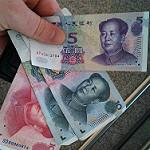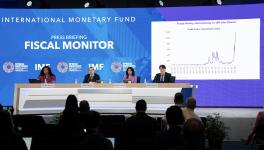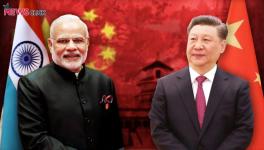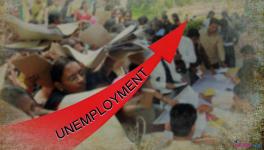China Stock Market Collapse: Economy Readjusting or Tanking?
If we read the Indian media, before Indrani-Sheena took over all the headlines, China's economy is tanking and this will be a boon to the Indian stock market. The global media was a little more balanced – their own stock markets are closely linked to the Chinese market -- and a contagion could be very easily be triggered by alarmist statements. So what is really happening in China?
One set of views regard the fall in the Chinese stock market as a “correction”. The stock market had overheated, rising to almost twice level in 12 months. It is the classic law of gravitation; what goes up must come down. Even after this fall, which shaved off almost 25% of the Shanghai Stock Index, it is about 30% higher than it was a year back. And there is a small uptick that is visible currently. The other stock markets that had also crashed 2 weeks back with the Chinese stock market collapse, have regained a lot of their value, though this is not uniform: some have recovered faster, some are recovering more slowly.

Image Courtesy: flickr.com
Those who argue on these lines also argue, “China’s economy is transforming from one that relies on exports and industrial production to one that seeks to satisfy the demands of its 1.4 billion consumers.” The lowering of the exchange rate of the yuan are steps towards making it convertible and one among the basket of currencies to which other currencies are pegged and changing over to a consumption-led growth rather than an export-led growth.
The other view is that the Chinese stock market collapse indicates a structural crisis of the Chinese economy. It is a symptom of the deeper crisis of the Chinese economy. This collapse is similar to the US housing bubble and the subsequent sub prime mortgage crisis, with the Chinese real estate boom consuming huge amounts of steel, cement and other commodities and hiding the real crisis of the Chinese economy. Since the real estate that has been built is far in excess of what can be realistically bought, this will lead to a collapse of the real estate market leaving the financial system with huge bad debts. In this view, the lowering of the exchange rate of the Yuan is an attempt to reflate the Chinese economy, make their exports more competitive and escape from this impending crisis.
Which view is correct? Or are there elements of truth in both these views? All such analysis is compounded by the deep distrust that western media and analysts have regarding data from China. While some are willing to concede that this is due to the transition from an economy dominated by big industries to one where a small business has become important and therefore less easy to monitor in terms of data, others accuse China of cooking its books. This is of course not unlike what India under the current Modi government has done, where methodologies of calculations are being changed to show higher rates of growth as well as dramatically lower farmers' suicides. But the uncertainty of data does make discussions on China even more difficult.
For those who think that the Chinese crisis will be a boon for the Indian economy, they forget that we had a real estate boom earlier with a slump right now. Realty companies and builders are in deep trouble. So are a number of private power companies, who have borrowed heavily and unable tp pay back their loans. All these have created a huge overhang of bad debts or non-performing assets in the banking system in the country. So if China's economy is in trouble, India's economy is not doing too well either.
While Newsclick will continue to discuss what is happening in the Chinese economy, it has put together a range of views on China's stock market collapse and what it means for the Chinese economy.
By Guntram B. Wolff, Director of Bruegel since June 2013, and Thomas Walsh, Bruegel Research Assistant in the area of macroeconomics. Originally published at Bruegel.
Should we be worried about the turmoil in China’s stock market, and the spill-overs to markets in other countries? Two competing hypotheses currently exist:
The first is that Chinese stocks had grown at unsustainable rates leading up to the crash, and this is simply a market correction back towards fundamentals, and not a warning of deeper weakness in the Chinese economy.
This view would align with that of the ECB’s vice-president Vitor Constâncio:
“Indications are that … the (Chinese) economy is not decelerating so much to justify the rout in the stock market. (…) The problems in China are not affecting … the concerns of German firms,”
Stock market declines around the world would in this view only represent some short-term financial contagion without a connection to real economic activity.
The second hypothesis is that the collapsing stock prices are linked to a slowdown in economic activity in China. Such a slowdown will then be passed on through trade linkages to China’s trading partners.
We want to investigate whether the stock market falls in Europe are primarily a financial contagion problem or whether they are linked to trade exposure to China. We look at the decline since the start of August until now, compared to the extent to which the respective OECD economy is linked to China, measured in gross exports to China as a share of GDP.
Contrary to the first hypothesis that this episode is just a matter of turbulence in financial markets, we can see that in Europe those countries with stronger trade connections to China have generally suffered bigger losses in their stock markets. We take this as an indication that there is a disruption in the real economy in China, leading to less demand for European exports to China that is passed on to European stock markets through trade channels.
See more at: http://www.nakedcapitalism.com/2015/08/china-sneezes-europe-catches-a-cold.html
What Caused U.S.-Chinese Market Turmoil?
Author: Dan Steinbock, August 26th, 2015
As the Fed is paving way for the first rate hike in a decade, the world economy prepares for the greatest shift of capital flows in half a decade. Recent market turmoil in the U.S. and China heralds the transition.
According to the conventional wisdom, the U.S. economy is recovering significantly faster than other advanced economies and the dollar is strengthening. In contrast, China’s economy is facing a slowdown with growth decelerating and the yuan depreciating.
The realities are more complicated. In early June, Dow Jones (DJIA) still exceeded 18,200 and the Shanghai Index was close to 5,200. But last week was the worst in Wall Street in four years as the DJIA plunged 531 points. In China, markets have been anxious ever since June.
So as U.S. markets sank, those in China followed until Beijing cut interest rates for the fifth time in nine months, along with reserve ratios. Consequently, U.S. and global markets rallied, but unease remains in the Mainland.
China’s exchange-rate adjustment
On August 11, the People’s Bank of China (PBoC) made a change to its central parity of the yuan against the U.S. dollar to better reflect market conditions. While the net effect was a de facto devaluation of 1.87% relative to the US dollar, the adjustment was characterized as “dramatic” in the West. China’s slowdown and market fall was seen to contribute or even to fuel U.S. uncertainty.
See more at: http://www.economonitor.com/blog/2015/08/what-caused-u-s-chinese-market-turmoil/
Get the latest reports & analysis with people's perspective on Protests, movements & deep analytical videos, discussions of the current affairs in your Telegram app. Subscribe to NewsClick's Telegram channel & get Real-Time updates on stories, as they get published on our website.
























